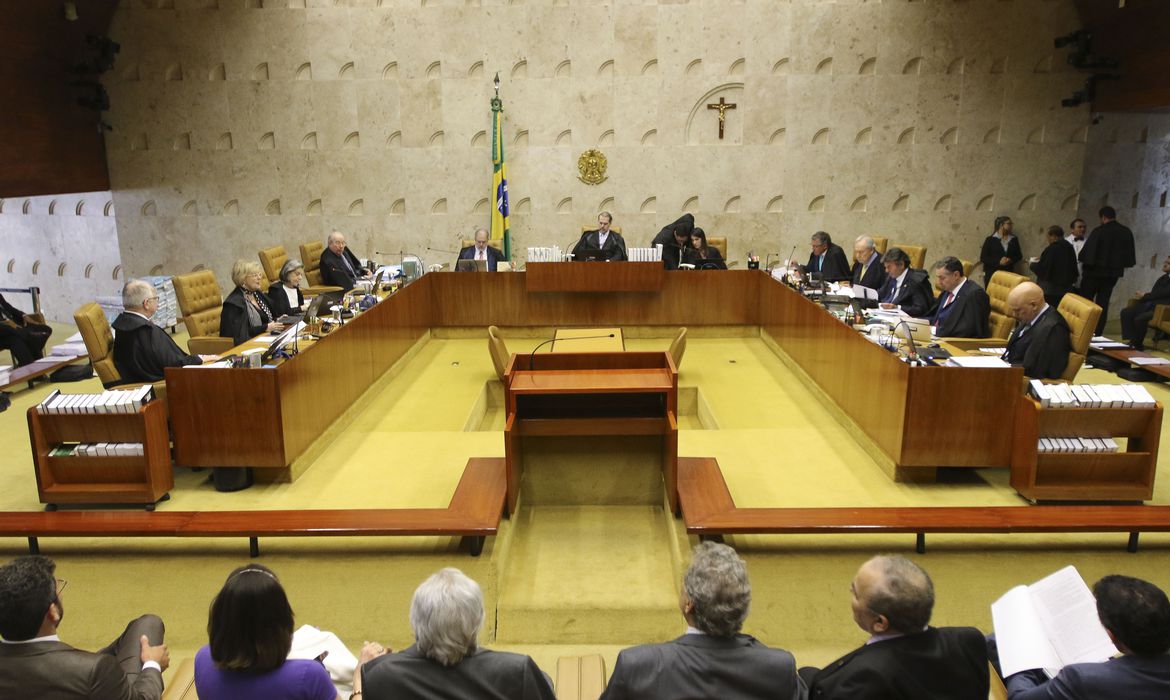RIO DE JANEIRO, BRAZIL – After a two-day session, the Federal Supreme Court (STF) decided on Thursday, by nine votes to one, to uphold the decision by Chief Justice Luiz Fux to overturn the monocratic (individual) habeas corpus order given by Justice Marco Aurélio Mello that freed trafficker André de Oliveira Macedo, a.k.a. André do Rap, who has been on the run since his release on Saturday, October 10th.
However, the vote on the merits was overshadowed by an internal dispute that began to take shape on Wednesday and exploded in the plenary session yesterday on the high-voltage question: does the Presiding Justice have the right to overturn, individually, an individual decision taken by another Justice who is theoretically his peer; in other words, is it possible to grant a kind of “superpower” to the Court’s President, whose mandate runs for only two years.
The dispute over this issue was brought to light by Marco Aurélio Mello himself. During his vote – the only one in favor of maintaining his own injunction – he stated that “what is at stake in this trial is whether the Court’s Chief Justice may withdraw the jurisdiction to decide a case from a peer.” He further said that the Chief Justice “can not be a censor among his equals, thereby discrediting the Supreme Court.”

Fellow Justice Ricardo Lewandowski said this would mean turning Chief Justices into “superjustices,” with more powers than the other Court members. He argued that magistrates should maintain the power to reach monocratic decisions more easily in urgent cases, mentioning as an example his ruling that allowed El País and Folha de S. Paulo to interview ex-president Luiz Inácio Lula da Silva, then imprisoned in Curitiba, in April 2019.
Justice Gilmar Mendes, one of the most vocal opponents of “superpowers,” said that if this possibility were to be accepted, it would have to be extended to all the other courts in the country – which, according to him, would create “a real mess”. According to Mendes, if the decision were to be adopted, the leadership of the courts would act as a “censor of public order”, thereby creating “a hierarchy that does not exist within the court.”
Mendes’ remarks provide an insight into the extent to which the dispute has taken over the Supreme Court. He spoke for almost an hour on the issue of “superpowers”- and less than 30 minutes on the merits of the allegedly major decision at stake.
In turn, at the end of Mello’s vote, Fux tried to deny the possibility of acquiring new powers. According to him, the decision taken in the case of André do Rap was a “very exceptional circumstance”. In his statement, he said that “I have no pretense to have superpowers, but I have every intention of preserving the image of the Federal Supreme Court.”
This was not enough to calm the spirits. Tensions escalated at the end of the session, with a heated spat between Fux and Mello. “That’s all that’s left, you want to teach me how to vote. I didn’t realize your authoritarianism was reaching that point,” said Mello, feeling that he was being pressured by the Chief. “All that’s left is for you to want to force me to change my vote.” Fux simply replied by demanding respect toward him and the Court as a whole.
Yesterday another panel of Justices had pointed to the possibility of reducing the individual power of magistrates, with a change in the internal regulations that would result in most monocratic decisions being analyzed quickly by the full court of 11 justices, which would confirm (or reject) the ruling.
In the words of Justice Luis Roberto Barroso, “we must always speak with one voice, with no one being able to personify the court individually. It implies a loss of power for the rapporteur but, in my opinion, this is offset by the strengthening of the Court.” His position, however, will surely face strong resistance from his fellow Justices, to judge by yesterday’s battles.
Should this measure progress, it would be a kind of unfolding of the decision taken earlier this month to return to the 11-Justice plenary session all inquiries and criminal actions involving authorities with privileged jurisdiction, such as politicians, justices, and judges of other courts, rather than keeping the proceedings centered in the two 5-Justice panels of the institution.
At the time, the initiative was perceived as an attempt to shield the Court from the influence of President Jair Bolsonaro, who is expected to appoint at least two STF justices by 2022 – but would have the consequence of reducing the individual clout of justices.

No surprises
In André do Rap’s hearing, there were no surprises. The decision had been drawn since Wednesday when six Supreme Court members had formed a majority for Fux’s decision to overturn Mello’s injunction. Yesterday, three more justices -Cármen Lúcia, Ricardo Lewandowski, and Gilmar Mendes – also declared their support for the decision, arguing that the release of the prisoner need not come immediately after the end of the legal term, the main argument used by Justice Mello to free the criminal.
Marco Aurélio Mello argued his own position: “I don’t feel in the dock, despite the countless criticism.” According to him, “the rule is freedom, and the exception is imprisonment, although those with the lash in their hand do not think so.” In his vote, the Justice stated that there had been a failure by the judge in charge of analyzing André do Rap’s release before the expiry of the 90-day pre-trial detention period, as provided by the recently amended law.
According to him, a good part of all prisoners in the Brazilian penitentiary system are in an unconstitutional situation, incarcerated without statutory justification.
Source: El País

